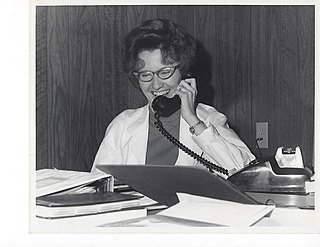
Joyce Nichols (born Clayton, June 28, 1940 - July 29, 2012) was an American physician assistant (PA). Nichols was the first woman and black woman to be certified as a PA, graduating from the Duke University Medical Center program in 1970.

Joyce Nichols (born Clayton, June 28, 1940 - July 29, 2012) was an American physician assistant (PA). Nichols was the first woman and black woman to be certified as a PA, graduating from the Duke University Medical Center program in 1970.
Nichols was born as Joyce Clayton on June 28, 1940, in Roxboro, North Carolina. [1] [2] Nichols was married at age 16, though with encouragement from her parents, she finished high school and went onto to beauty school. [2] Later, she attended Carolina College (later North Carolina Central University) where she made it half-way to a degree in psychology before her finances ran out. [2] In 1965, she received a scholarship to study as a licensed practical nurse (LPN) and after graduation in 1966, she started working in the cardiac care unit at Duke Hospital. [2] In the hospital, she learned about the physician's assistant (PA) class at the Duke University Medical Center [2] from a former Navy corpsman who worked with her in her cardiac unit. [3]
The PA Program had been made up strictly of men, especially those with former experience as Navy corpsmen, was reluctant to enroll Nichols. [4] [2] However, she was encouraged to apply by Doctor Eugene Stead, the creator of the PA training program. [1] Nichols was accepted and fought to be given the same stipend as the men in the program. [1] During her training, she still worked in the cardiac unit to support her family. [1] She and her family also lost their house due to a fire in 1969 and the faculty and students at the PA school helped to raise money to help Nichols' family. [4] They put on a dance, sold tickets and raised enough funds to replace her household items and buy clothing and Christmas presents for the kids that year. [3] Right before her graduation she met with Doctor Eugene Stead to talk about her employment and she was exploring the possibility of working for a couple of local African-American physicians who had been her preceptors in the program. [3] Nichols graduated from the program in 1970, becoming the first woman to earn a degree as a PA. [4]
When she graduated, she was able to get funds with the help of Doctor E. Harvey Estes Jr., to open a rural, satellite health clinic. [1] She worked in Rougemont and Bahama for two years, providing preventative healthcare to individuals who had not had easy access to medicine in the past. [1] In 1972, she moved to the Lincoln Community Health Center and continued to provide healthcare to rural communities. [1] Nichols continued here until her retirement in 1995. [1] At the time of her retirement she was managing the Diabetes and Hypertension Clinics and providing primary care services to the homeless shelter in Durham. [5] After retirement, Nichols stayed involved in her community in various capacities, including raising money for healthcare and volunteering in political campaigns. [1]
She was inducted into the Duke University PA Alumni Hall of fame in 2002 for her concerns for poor people and her advocacy skills. [3]
Nichols died in her home in Durham, North Carolina on July 29, 2012. [4] At her funeral, three of her close professional colleagues, John Davis, PA-C, Earl Echard, PA-C and Lovest Alexander, PA-C, paid tribute to her legacy as a pioneering physician assistant. [3]
In July 2020, the PA Foundation announced the launch of the Joyce Nichols Memorial Scholarship, a new scholarship to be award to Black PA students. Based upon the funding that was committed at the time of the announcement, a minimum of four $1,000 were to be awarded in 2020 and the next five years following. [5]
A Physician Assistant or Physician Associate (PA) is a type of healthcare professional. While these job titles are used internationally, there is significant variation in training and scope of practice from country to country, and sometimes between smaller jurisdictions such as states or provinces. Depending on location, PAs practice semi-autonomously under the supervision of a physician, or autonomously perform a subset of medical services classically provided by physicians.
The Commonwealth Fund is a private U.S. foundation whose stated purpose is to "promote a high-performing health care system that achieves better access, improved quality, and greater efficiency, particularly for society's most vulnerable, including low-income people, the uninsured, and people of color." It is active in a number of areas related to health care and health policy. It is led by Joseph R. Betancourt, M.D., M.P.H.

Eugene Anson Stead Jr. is best known as a physician, medical educator, and researcher. He served on the faculties at Harvard, Emory, and Duke universities. He is the founder of the physician assistant (PA) profession.

Philadelphia College of Osteopathic Medicine (PCOM) is a private medical school with its main campus in Philadelphia, Pennsylvania, and additional locations in Suwanee, Georgia and Moultrie, Georgia.

Regina Marcia Benjamin is an American physician and a former vice admiral in the U.S. Public Health Service Commissioned Corps who served as the 18th Surgeon General of the United States. Benjamin previously directed a nonprofit primary care medical clinic in Bayou La Batre, Alabama, and served on the board of trustees for the Morehouse School of Medicine.
The Duke University School of Medicine, commonly known as Duke Med, is the medical school of Duke University. It was established in 1925 by James B. Duke.

Bernard Lown was a Lithuanian-American cardiologist and inventor. Lown was the original developer of the direct current defibrillator for cardiac resuscitation, and the cardioverter for correcting rapid disordered heart rhythms. He introduced a new use for the drug lidocaine to control heartbeat disturbances.
The Duke University Health System combines the Duke University School of Medicine, the Duke University School of Nursing, the Duke Clinic, and the member hospitals into a system of research, clinical care, and education.
Marshall B. Ketchum University is a private university focused on graduate programs in healthcare and located in Fullerton, California. MBKU expanded from the Southern California College of Optometry which was founded in 1904. The university was officially established as a multidisciplinary university with the addition of School of PA Studies in 2011 and College of Pharmacy in 2013. Along with Hope International University, the campus bookends the north and south sides of the Cal State Fullerton campus respectively.
A clinical officer (CO) is a gazetted officer who is qualified and licensed to practice medicine.
Duke University Hospital is a 1048 -bed acute care facility and an academic tertiary care facility located in Durham, North Carolina, United States. Established in 1930, it is the flagship teaching hospital for the Duke University Health System, a network of physicians and hospitals serving Durham County and Wake County, North Carolina, and surrounding areas, as well as one of three Level I referral centers for the Research Triangle of North Carolina. It is affiliated with the Duke University School of Medicine.

A rural health clinic (RHC) is a clinic located in a rural, medically under-served area in the United States that has a separate reimbursement structure from the standard medical office under the Medicare and Medicaid programs. RHCs were established by the Rural Health Clinic Services Act of 1977, . The RHC program increases access to health care in rural areas by
Sivaramakrishna Iyer Padmavati was an Indian cardiologist. She was director of the National Heart Institute, Delhi, and the founder president of the All India Heart Foundation. The institute collaborates with the World Health Organization (WHO) in training students in preventive cardiology. Padmavati was awarded India's second highest civilian honour, the Padma Vibhushan in 1992. Padmavati, an elected fellow of the National Academy of Medical Sciences, was the first woman cardiologist in India and established the first cardiac clinic and cardiac catheter lab in India.
Dr. Hilla Sheriff was a South Carolina physician whose positions included being a Health Officer in Spartanburg County and being the Director of the Board of Health's Division of Maternal and Child Health in Columbia, South Carolina. Gender barriers were present in the South at this time which she navigated through in her practice. She became one of the most respected medical officials in the twentieth century. She devoted much of her life to eradicating diseases, such as pellagra and diphtheria, which plagued the poor and marginalized communities of South Carolina. During her career, she also made improvements to contraception, maternity care, and family planning practices.

Gladys Nichols Milton was a Florida midwife and advocate for women's health. She was inducted into the Florida Women's Hall of Fame in 1994.
Elizabeth Inez Parks Pruitt is a physician assistant from Virginia. She was named one of the Virginia Women in History for 2013.

Martha K. Schwebach was the first family nurse practitioner in the United States. After joining a pilot program at the University of New Mexico designed to address a physician shortage in non-metropolitan and rural areas, Schwebach received her certification in 1969 and went on to practice in the Estancia Valley and Moriarty, New Mexico. In 1974, she was honored at the White House as one of Ten Outstanding Young Women of America. Schwebach worked as a family nurse practitioner and clinic administrator in rural New Mexico until her retirement in 2006, during which years she also wrote, lectured, and consulted in various locations across the United States on the special health care needs of rural America.

Emily Hammond Wilson Walker was an American medical doctor. Only the second woman to graduate from her medical school, the Medical College of Georgia, she was initially refused a position at Anne Arundel Hospital but went on to become its chief of staff. A career country doctor of more than 50 years, she set up early sexual health and prenatal clinics and diagnosed the first case of Rocky Mountain spotted fever in Maryland. She was known for her willingness to treat all patients regardless of means, as well as her resistance to Jim Crow laws, welcoming African American patients into her waiting room alongside white ones.
Ruth L. Collins-Nakai is a retired Canadian cardiologist, educator, researcher, physician leader, healthcare advisor, and public health advocate.